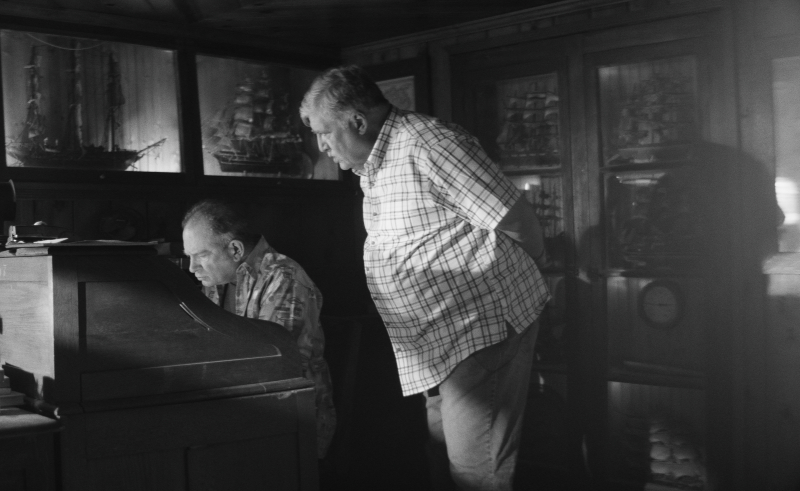(IMAGE: Red Phoenix Productions)
Red Phoenix Productions, 2022. 81 minutes. Comedy.
Grade: 1 out of 4
What differentiates a stage play from a screenplay? In Los Angeles, at least, it’s not as simple as it may seem. With much of the theater scene populated by folks who really want to be making bigger bucks in the movie business, so many stage productions get conceived as dry runs for film projects. Murder, Anyone? addresses this dichotomy without solving it.
Conceived as a play by the late writer Gordon Bressack, and turned into a movie by his son James Cullen Bressack, it centers on two writing collaborators (voice-actor extraordinaire Maurice LaMarche and animation writer/L. Ron Hubbard lookalike Charles M. Howell IV) trying to write a murder mystery. Charlie (Howell) thinks it’s a play; George (LaMarche) insists a movie would be better. Between their (black and white) arguments, the movie cuts to (color) enactments of what they’re actually writing. As the writers bicker and change their minds about plot points, key elements of the performance change.
Essentially, this plays like an 81-minute version of the Whose Line Is It Anyway? recurring sketch “Hollywood Director,” in which one performer, usually Colin Mochrie, plays a director who places the other performers into a situation, then periodically stops them to change the genre completely. On the stage, with talented improvisers, this maybe could have worked. In the movie, it doesn’t, and having Charlie call the final product “ten pounds of shit in a five pound bag” at the end is all too easy. Self-deprecation can be charming, but doesn’t immunize a deserving production from deprecation elsewhere.
And the deprecation is at least partly deserving. The LaMarche/Howell bits are fun enough – Howell, not usually an actor, regularly collaborates with LaMarche as a writer which leads to easy banter, and of course the latter busts out some of his impersonation gems like Orson Welles and Anthony Hopkins. The story they’re writing, though, is painful. It involves a murderer (Kristos Andrews) coming to rob an heiress (Galadriel Stineman), and numerous would-be Deathtrap-style twists ensuing. Complete, of course, with scenes of the writers arguing to what degree they should borrow from Deathtrap.
If you took note of the 81-minute running time, however, and have realized that if half the movie is writers arguing, you might have deduced there’s not much time for actual plot. Indeed, there isn’t – though there’s an intermission at the 48-minute mark! The plot beats are essentially these: murderer Cooper shows up at heiress Bridgette’s house. His accomplice shows up and gets killed, dying as slowly as Will Ferrell in Austin Powers without being in any way as funny. Then a blind French psychic (Carla Collins) appears and does a séance. That’s basically it.
That’s right: a blind French psychic, who says “Happiness” in a way that sounds like “a penis” about six times. It’s a Troma-level joke, except that while Troma’s Lloyd Kaufman is excessively fond of blind jokes, the blind are also generally the most virtuous characters in his films. Bressack has all his characters yell their lines as if they’re projecting in a theater, complete with the exaggerated mid-Atlantic accent of ’50s cinema. The scenario begins on stage, and later transfers to a set – while it does the stage part, canned audience reactions like those on Married…With Children add an extra layer of self-referentialism.
It’s difficult and unfair to impeach Bressack’s intentions. He made a promise to his dying father to try to get this script and others made, and called in favors from LaMarche and other collaborators from Pinky and the Brain, for which his dad wrote. But that inherent level of reverence does the material a disservice, firstly in that it does not adapt well from stage to screen, and secondly, in that it needed a fundamental reconception to work even as a play. Plus Bressack the elder’s pop culture references are nowhere near as clever here as in the cartoons he authored – this is the sort of movie that references Freddy Krueger a few times solely because Nightmare on Elm Street franchise star Lisa Wilcox makes an appearance at the end. [Not a spoiler – the opening credits mention her.]
LaMarche and Howell’s characters ought to be the comic relief in some much larger tableaux. As writers, their characters truly suck, but as scene partners, they’re fun enough not to waste on this misguided project.

